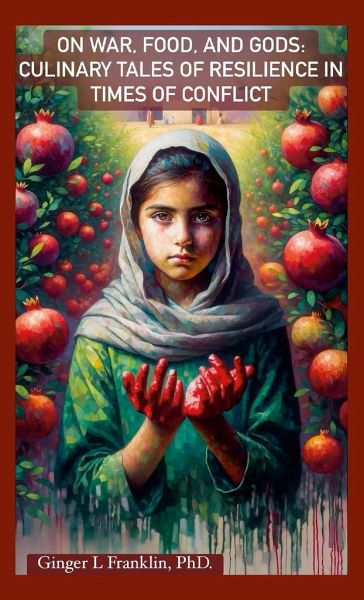
On War, Food, and Gods
Culinary Tales of Resilience in Times of Conflict
Versandkostenfrei!
Versandfertig in über 4 Wochen
16,99 €
inkl. MwSt.

PAYBACK Punkte
8 °P sammeln!
On War, Food, and Gods: Culinary Tales of Resilience in Times of Conflict" by Ginger L. Franklin, PhD., is a profound exploration of how food becomes a cornerstone of human resilience and identity in the harsh landscape of war and religious conflict. This collection of poignant stories, drawn from real events and personal encounters, captures the essence of how meals can serve as a bridge between cultures and a comfort amid chaos. Franklin's narrative weaves together the diverse threads of human experience, showing how food-beyond its basic role as sustenance-acts as a powerful symbol of commu...
On War, Food, and Gods: Culinary Tales of Resilience in Times of Conflict" by Ginger L. Franklin, PhD., is a profound exploration of how food becomes a cornerstone of human resilience and identity in the harsh landscape of war and religious conflict. This collection of poignant stories, drawn from real events and personal encounters, captures the essence of how meals can serve as a bridge between cultures and a comfort amid chaos. Franklin's narrative weaves together the diverse threads of human experience, showing how food-beyond its basic role as sustenance-acts as a powerful symbol of community, continuity, and survival. The book delves into how culinary practices are influenced and transformed by the pressures of war and religious strictures, employing the theoretical frameworks of anthropologists like Claude Lévi-Strauss and sociologists like Arjun Appadurai. These perspectives highlight how food, often taken for granted, is deeply embedded in the cultural, social, and political fabric of societies undergoing turmoil. Through detailed and heart-rending accounts-from the pomegranate fields of Afghanistan to the bustling lanes of Old Delhi-Franklin illustrates how meals can articulate identity, resistance, and hope. Each chapter focuses on a different geographic area and conflict period, offering insights into the local food culture and the ingenious adaptations people make to preserve their culinary heritage. For instance, the book describes how, amidst the scarcity of war, people innovate with available resources to create new dishes that reflect their changed realities, thus keeping their cultural identities alive even in times of severe disruption. The stories also reflect on the role of religion in shaping dietary habits and food symbolism, demonstrating how religious practices and food are mutually reinforcing. Franklin's narrative is rich with anecdotes of how food serves as a mediator in religious conflicts, providing common ground amid diversity and division. Overall, "On War, Food, and Gods" is not just a collection of food tales but a significant academic contribution to the fields of cultural studies, anthropology, and conflict resolution. It offers readers a unique lens through which to view the impact of war and conflict, highlighting the universal power of food to unite and heal.












